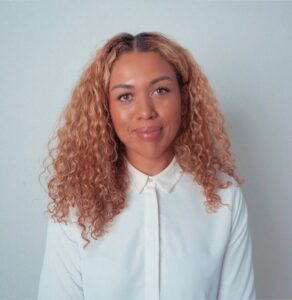
[Editor’s Note: Shaffra Gray-Read, senior reputation manager for KFC (UK & Ireland), is a finalist in the arts & media rising star category for the 8th annual Black British Business Awards 2021. Prior to joining KFC earlier this year, she worked at Weber Shandwick, as well as at the UK’s Home Office, leading its Brexit communication strategy. In addition to reputation, she’s worked in crisis communication, media relations, corporate affairs and strategic communication. In this interview, we asked what KFC is doing to bolster its reputation. We also discussed her interest in diversity & inclusion as well as her penchant for using data. Gray-Read spoke with us in early August from London. Her remarks were lightly edited for space. A shorter version of this interview will appear in the September edition of PRNEWS.]
PRNEWS: Please give us an example of something KFC is doing to build reputation.

Shaffra Gray-Read: One of the things I’ve been working on is a partnership with Keep Britain Tidy, which is a charity for the environment. We’ve partnered with them on their Great British Spring Clean.
During the pandemic the UK has had a bit of a litter problem, people disposing of litter in public spaces, people going to restaurants [for take-out] and disposing their litter on streets.
So, one of the things we really want to try and help improve is encouraging our guests to dispose of litter in a responsible way. But, also making sure that we, as a business, take that responsibility seriously.
So, a month or two ago we created a couple of initiatives insuring that our impact when it comes to litter is fleshed out. We’re engaging more with local councils and local government to see what we can do within our communities and perhaps collaborate further. But, also with our team members, how can we train them and add to their knowledge about why, as a business, we need to be managing our responsibility more seriously.
That’s one piece of a bigger puzzle and ladders up to a larger initiative we’ve done around the environment and our pledge to be net zero by 2040.
What we’re trying to do is to look at different areas of the business, whether it’s our planet, or social impact…and work out where we really need to be shifting the dial and doing more internally and externally to help improve reputation.
PRNEWS: How is KFC training staff to take litter more seriously?
Gray-Read: We are currently designing training on that. Most of our training resources are online. For this particular program, we are working with partners to tailor something more for our staff, though we are working on creating training [for litter] now. Hopefully, it will be modular based so we can add to it. And people can use it in the same portal they already use for other training materials.
PRNEWS: What’s the most difficult area, right now, to build reputation in: third parties, government, regulators, employees?
Gray-Read: It all depends on the project and the topic and what your aim is. As I’ve not been at KFC too long, I don’t have a very good answer from a KFC perspective. Over the years, though, I’ve found where there’s a lot of passion and the stakes are high, it will be difficult to engage different groups.
I’ve seen that building reputation is a ground-up operation, but it’s also top-down. You need to get the right people in the business to support what you’re doing, but also speaking about what you’re doing is such an important thing to build reputation.
PRNEWS: Give us an example of a crisis that’s likely to occur in this time of COVID-19, tense race relations, dire economic circumstances for some and cybercrime.
Gray-Read: Well race relations was a big area that I was working on when I was at Weber Shandwick. The events of last year obviously heightened conversations around race relations. Diversity & Inclusion is an area where brands are having so many more awkward conversations internally and externally around what to do to improve race relations.
Last year we saw brands struggle with how to engage and when to engage. It’s not that there’s not the appetite to engage, but sometimes there’s a lack of understanding around all the context of the issue. Race relations is not an issue that will fade away. It’s not necessarily a crisis, but it’s an important issue that needs to be spoken about more and managed more in a genuine way.
PRNEWS: What about race relations in the UK and how companies communicate about it?
Gray-Read: Before last year people in the UK would say race relations is not a big issue here. But I think last year showed that while race relations is more subtle in the UK, [companies] really need to have those open, honest discussions about it and issues around intersectionality and how one sees themselves in an organization.
Gen-Z leans into this and embraces everything about intersectionality. They are the leaders of tomorrow and the talent that people are seeking for business. So, being able to lean into and address these issues is so important. It will grow and people need to be more adept at addressing and managing it.
It’s not something that can just be a nice statement, which a lot of people did last year. We need tangible action and an understanding of addressing inequalities in society that seep into other areas.
PRNEWS: Here in the US, some PR pros approach data and measurement reluctantly. Though it’s changing, PR still is a field that’s attractive to people who don’t want to work with numbers. Is it the same in the UK?
Gray-Read: Yes. As in the US, it’s getting better here.
PRNEWS: Why your interest in data?
Gray-Read: A couple of years ago, I took a year off and went back to university to get a master’s in behavioral science. One of the reasons I did that is I wanted to ground my practical experience with more theoretical knowledge. One of the things I developed was being able to look at a data set and trying to pull out the insight to inform approaches.
I love qualitative data. There’s a richness in it that you can get from discussions…to help understand why something is the way it is. Then, quantitative data helps to really put an overlay of information on top of that. It’s really important to be able to understand research and extrapolate certain things…to arrive at how you want to take things forward based on insight from data that informs your approach.
PRNEWS: Can you give us an example where you changed course based on data?
Gray-Read: In my master’s, I looked at Black communities, specifically Black male communities. I spent 3 months doing an ethnography in a barber shop observing how people interact with each other.
One thing I gained from that was that music, particularly grime music, was a huge part of peoples’ identity and culture, particularly Black culture in the UK. One of the things I changed as part of my approach was looking at lyrics to songs.
It just so happened [British rap artist] Stormzy visited that barber shop. I managed to do an in-depth interview with Stormzy, but also analyze his lyrics to make a correlation between the topics of conversation that go on in the barber shop and how prevalent they are in Black culture, especially Black male culture, in London.
The issues Black men are facing are evident in their barber shop conversation but also in the lyrics of music and they become part of the lived experience. To get the fullest out of my research, I needed to add that dimension to it. And it became such an important part of the research. So, that’s an example of how I switched a research method to help inform a better approach.
PRNEWS: There’s so much companies can do to advance social and racial issues.
Gray-Read: Yes. One of my biggest passions and ambitions is to do a doctorate in this area. And I’m interested in how brands can play a big part in helping underserved and underprivileged communities to excel. To do this, companies need to understand the issues Black people face.
These are issues right at our fingertips, though they’re not necessarily noticed, but they must be understood. The way you can understand these issues is by actually engaging certain people in communities to explore how we can work together to create solutions.
PRNEWS: What are some of the things you consider working in a global company?
Gray-Read: Every market has its headwinds. From a global perspective, it’s about having consistency of brand in different markets, but it’s also about leaning into the culture of the market and making sure there’s local resonance with a global approach.
PRNEWS: How did you get into the reputation field?
Gray-Read: I started out in law. When I was doing that I always wondered if law was for me. I thought about doing something more creative and I did a few internships. I did one in PR.
When I finished my degree, I thought I should give law a proper go. So, I did an internship in NY at an employment law firm. One of the cases we did was against Dominique Strauss-Kahn, the former head of the International Monetary Fund.
There was so much media interest in this case. I was really interested in how you protect both the reputation of the law firm and the client. The more I thought about it, the reputation side of law is so important, in order to build trust and engage your audience, you have to build positive reputation and increase positive perception of your brand.
So, after that internship, I came back to London and started working in law, but more so in legal PR. So, you’re working on how you build a positive corporate reputation for the [law firm’s] brand by engaging stakeholders and clients, but also by discussing things in the media that build the brand.
Now, with KFC, obviously reputation is built over many years, but it also can be ruined in a matter of minutes. At KFC there’s such an incredible job to be done to build trust with our customers, but also with our stakeholders, with government, NGOs and different society groups.
